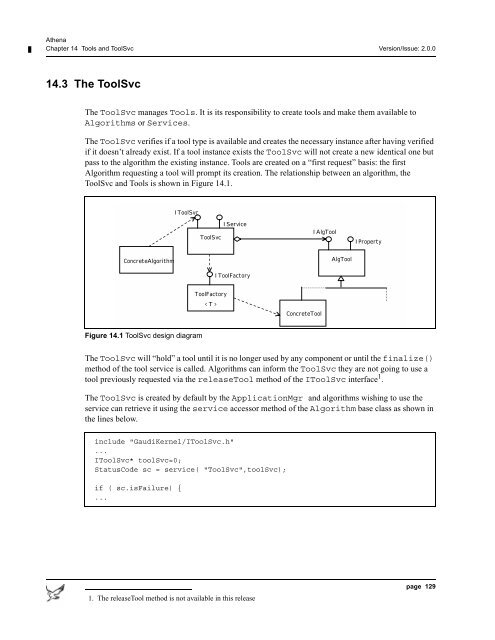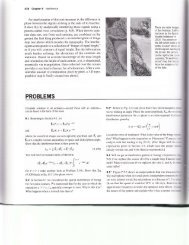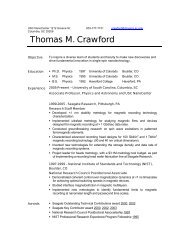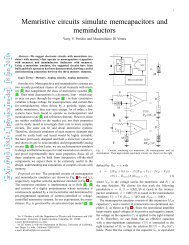Athena Developer Guide
Athena Developer Guide
Athena Developer Guide
Create successful ePaper yourself
Turn your PDF publications into a flip-book with our unique Google optimized e-Paper software.
<strong>Athena</strong><br />
Chapter 14 Tools and ToolSvc Version/Issue: 2.0.0<br />
14.3 The ToolSvc<br />
The ToolSvc manages Tools. It is its responsibility to create tools and make them available to<br />
Algorithms or Services.<br />
The ToolSvc verifies if a tool type is available and creates the necessary instance after having verified<br />
if it doesn’t already exist. If a tool instance exists the ToolSvc will not create a new identical one but<br />
pass to the algorithm the existing instance. Tools are created on a “first request” basis: the first<br />
Algorithm requesting a tool will prompt its creation. The relationship between an algorithm, the<br />
ToolSvc and Tools is shown in Figure 14.1.<br />
IToolSvc<br />
ToolSvc<br />
IService<br />
IAlgTool<br />
IProperty<br />
ConcreteAlgorithm<br />
AlgTool<br />
IToolFactory<br />
ToolFactory<br />
< T ><br />
ConcreteTool<br />
Figure 14.1 ToolSvc design diagram<br />
The ToolSvc will “hold” a tool until it is no longer used by any component or until the finalize()<br />
method of the tool service is called. Algorithms can inform the ToolSvc they are not going to use a<br />
tool previously requested via the releaseTool method of the IToolSvc interface 1 .<br />
The ToolSvc is created by default by the ApplicationMgr and algorithms wishing to use the<br />
service can retrieve it using the service accessor method of the Algorithm base class as shown in<br />
the lines below.<br />
include "GaudiKernel/IToolSvc.h"<br />
...<br />
IToolSvc* toolSvc=0;<br />
StatusCode sc = service( "ToolSvc",toolSvc);<br />
if ( sc.isFailure) {<br />
...<br />
1. The releaseTool method is not available in this release<br />
page 129
















